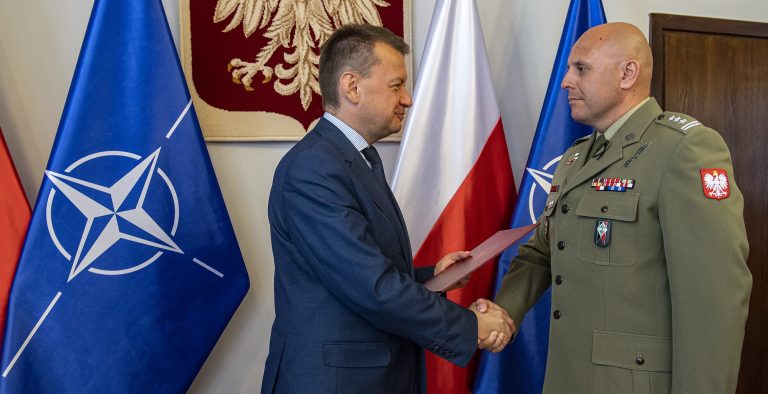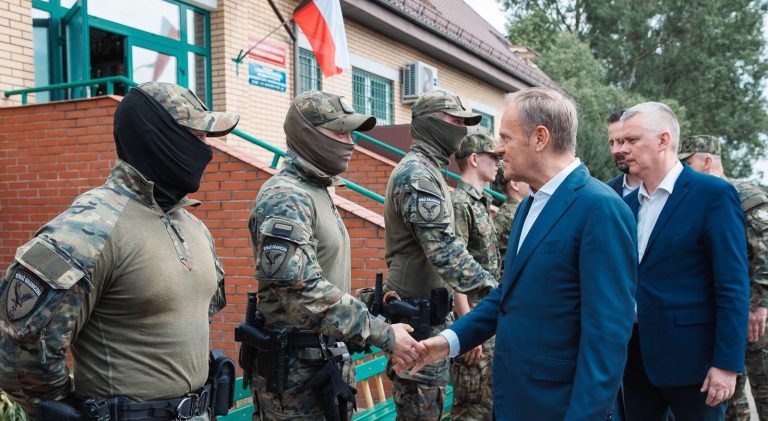Poland to “fight for exemption” from EU’s migrant relocation plans

The Polish government says it will seek to negotiate an exemption from elements of the EU’s planned migration pact relating to the relocation of asylum seekers. It argues that Poland has a “unique” situation due to the migration crisis on its border with Belarus and its reception of Ukrainian refugees.
“The situation on the Polish-Belarusian border is so unique that any solutions to the migration pact should take this specificity into account,” said interior minister Marcin Kierwiński in Brussels yesterday. “Poland will fight to be simply exempt from these [relocation] mechanisms.”
“Poland accepted war refugees; we are the country that helps Ukraine the most. And we hope that we will be treated very individually in this respect,” he continued, adding that “it is a pity the previous government did not take care of these conditions” during negotiations over the pact.
The EU’s proposed migration pact has been approved by a majority of ambassadors from the 27 member states, despite opposition from Poland.
The Polish government says the measures „do not strike an appropriate balance between responsibility and solidarity” https://t.co/8bs8xtTGIC
— Notes from Poland 🇵🇱 (@notesfrompoland) February 9, 2024
Those negotiations took place largely under the rule of the former national-conservative Law and Justice (PiS) government, which also expressed strong opposition to the relocation elements. They finished on 20 December, one week after PiS had been replaced by a new, more liberal government led by Donald Tusk.
The pact would introduce more effective checks on migrants and a faster system for returning failed asylum seekers to their countries of origin. But it would also require member states to show “solidarity” with countries on the frontline of migration through financial support or by accepting some relocated asylum seekers.
In early January, Tusk made clear his opposition to the latter aspect of the pact, pledging that Poland “will not accept a single migrant” under the scheme. The following month, Poland’s EU ambassador opposed the pact, but it was approved by a majority of member states.
The “brutal truth” is that the “survival of Western civilisation” depends on preventing “uncontrolled migration”, says Polish Prime Minister @donaldtusk.
„We [must] wake up and understand that we have to protect our borders…[or] our world will collapse” https://t.co/mPwGIMCoU9
— Notes from Poland 🇵🇱 (@notesfrompoland) February 12, 2024
Tusk’s government has argued that its PiS predecessors, despite voicing public opposition to the pact, failed to negotiate necessary safeguards for Poland.
“It was the government of our predecessors that negotiated this pact. In our opinion, in many respects it is simply not adapted to the Polish situation,” said Kierwiński, quoted by the 300Polityka news website.
“It does not take into account the uniqueness of Poland in terms of being a border country with a country where there is a war going on. Hence, we decided not to support these solutions,” he added. “We will defend the Polish national interest and we will do what the PiS government did not do.”
Kierwiński: Nie zgadzamy się, by pakt migracyjny nie uwzględniał polskiej specyfiki#300POLITYKALIVEhttps://t.co/kjBKqlHWsX
— 300Polityka (@300polityka) March 5, 2024
Kierwiński added, however, that if the pact does go into force the Polish government would meet any obligations it has to implement it.
Last year, when the PiS government expressed opposition to the pact’s proposed relocation mechanism, the EU’s home affairs commissioner, Ylva Johansson, argued that the system would take into account Poland’s circumstances.
Indeed, she claimed that “countries that are under such pressure, as Poland is now, will benefit from” the pact by gaining access to the support of other member states.
Poland’s criticism of the EU’s planned migration pact is „incomprehensible” and „untrue”, says Commissioner @YlvaJohansson.
She says Poland would be exempted from receiving or paying for additional migrants because it is hosting so many Ukrainian refugees https://t.co/2j70gylHly
— Notes from Poland 🇵🇱 (@notesfrompoland) June 26, 2023
In order to go into force, the pact must be approved by the European Parliament, which is expected to happen this month or in April at the latest, reports Polskie Radio. However, the relocation element of the pact will not be implemented for another two years.
Since mid-2021, Poland has faced a crisis at its border with Belarus, where tens of thousands of migrants and asylum seekers – mainly from the Middle East, Asia and Africa – have tried to cross with the help of the Belarusian authorities.
Poland was also the primary destination for refugees from Ukraine fleeing after Russia’s invasion in 2022, with millions crossing its border and around one million still remaining in the country today.
Poland carried out over 6,000 so-called „pushbacks” of migrants who crossed the border from Belarus between July 2023 and January 2024.
It is the first time the government has released data on the practice, which has been criticised by human rights groups https://t.co/DA5mCB7vAC
— Notes from Poland 🇵🇱 (@notesfrompoland) February 7, 2024
Notes from Poland is run by a small editorial team and published by an independent, non-profit foundation that is funded through donations from our readers. We cannot do what we do without your support.
Main image credit: 16 Dywizja Zmechanizowana/KPRP (under CC BY-NC-ND 2.0)

Daniel Tilles is editor-in-chief of Notes from Poland. He has written on Polish affairs for a wide range of publications, including Foreign Policy, POLITICO Europe, EUobserver and Dziennik Gazeta Prawna.






